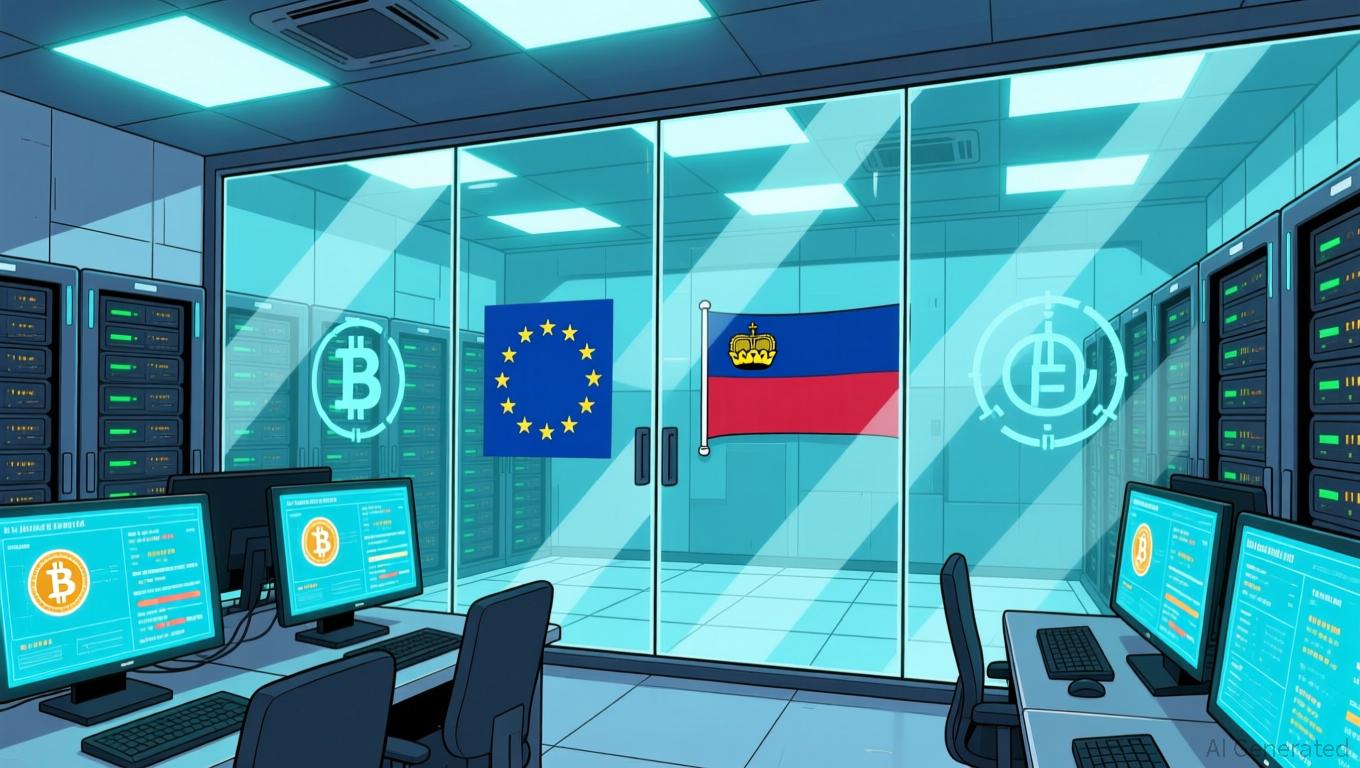Bitcoin News Update: Liechtenstein Introduces Blockchain Platform Featuring Enterprise-Level Security and Adherence to EU Regulations
- Bitcoin Suisse, Solstice, and Obol launch Liechtenstein’s Trust Integrity Network (LTIN), a state-backed blockchain offering EU-compliant services to enterprises. - The network uses Obol’s Distributed Validator Technology (DVT) to enhance security and multi-jurisdictional redundancy, ensuring institutional-grade reliability and slashing protection. - LTIN, majority-owned by Telecom Liechtenstein, adheres to EU MiCAR regulations, GDPR data sovereignty, and 100% renewable energy, supporting institutional a
Bitcoin Suisse, Solstice, and Obol have partnered to establish a sovereign validator infrastructure for the Liechtenstein Trust Integrity Network (LTIN), a government-supported blockchain project designed to deliver regulatory-compliant solutions to European businesses and organizations. This partnership represents a major advancement in institutional blockchain offerings within Liechtenstein’s forward-thinking regulatory environment, according to a
LTIN, a public-private initiative primarily owned by Telecom Liechtenstein, operates under the Blockchain Act (TVTG) and complies with EU MiCAR regulations. The network delivers regulatory clarity, GDPR-compliant data control, and institutional-level security powered entirely by renewable energy, according to the Bitcoin Suisse statement.

The DVT cluster, now available for institutional participation, offers businesses improved uptime, protection against slashing, and redundancy across multiple jurisdictions. Bitcoin Suisse emphasized its consistent outperformance of industry standards in staking returns through advanced systems and processes in the Bitcoin Suisse statement. This partnership highlights the increasing need for compliant, sovereign infrastructure to support institutional blockchain adoption, especially as Ethereum’s validator diversity and network decentralization are vital for its future resilience, a topic also covered in the Crowdfund Insider report.
This alliance further enhances Bitcoin Suisse’s role in Europe’s digital asset landscape, supporting Liechtenstein’s goal of becoming a leading center for regulated blockchain development. By merging government support with distributed governance—allocating 49% ownership to ecosystem participants—the LTIN framework illustrates how public-private collaborations can accelerate widespread adoption while tackling both regulatory and technical hurdles, as detailed in the Bitcoin Suisse statement.
Disclaimer: The content of this article solely reflects the author's opinion and does not represent the platform in any capacity. This article is not intended to serve as a reference for making investment decisions.
You may also like
Bitcoin Updates: Fed Divided Over Rate Reduction Amid Conflicting Inflation and Employment Concerns
- Fed officials debate December rate cuts amid conflicting inflation data and labor market risks, with no consensus on policy path. - Short-term inflation expectations rose to 4.7% in Nov 2025, while long-term forecasts stabilized at 3.6%, reflecting cautious public confidence. - Government shutdown delays critical economic data, forcing policymakers to rely on limited information as officials warn against both high rates and rapid cuts. - Tech/industrial firms showed resilience with strong Q3 earnings, co
LUNA Rises 10.0% in a Day Despite Market Fluctuations
- LUNA surged 10.0% in 24 hours on Nov 7, 2025, but remains down 78.51% year-to-date amid broader crypto market declines. - Analysts attribute the short-term rebound to buying activity, yet highlight persistent bearish trends and macroeconomic uncertainties. - Technical indicators show LUNA trading below 50-day and 200-day moving averages, reinforcing the continuation of a long-term downtrend. - Backtesting suggests sharp price surges like LUNA's 5%+ daily gains historically lack sustained momentum without
European Central Bank to launch digital euro pilot phase starting in 2027
DeFi protocol Balancer suffers 128 million USD hack